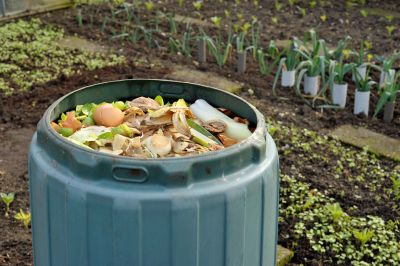Why Keeping Compost Bins Clean is Important
If you have curbside pickup of compost, you have a bin dedicated to stinky, rotting vegetables and other food and garden waste. Unlike garbage bins that usually contain bagged trash, for these bins, you simply throw the food in. This strategy is simple, but it also makes for a stinking mess, especially during the summer. You’ll need to clean it regularly to prevent pests, like flies, and an unbearable odor. Leave it too long and you’ll need a gas mask to clean it out. For your garden compost bin, it’s important to clean it regularly so you can keep moving out finished compost and continually provide new material for microbes and insects to get to work making more.
How to Clean a Compost Bin
If you have a small bin indoors that you use to collect kitchen waste, keep it in the freezer to maintain sanitary conditions and reduce odors. Even so, you should wash it regularly, just as you would wash dishes. For washing a compost bin for curbside pickup, you’ll need to get out the hose and some natural cleaners. Instead of soap, which can damage your local ecosystem, use vinegar, lemon, and baking soda to sanitize and de-stink the bin. Some preventative measures will help keep your curbside compost bin cleaner longer. You can line it with newspaper and sprinkle that with baking soda to absorb moisture and odors. Also, look for compostable bags to hold scraps. Make sure your waste pickup service accepts the bags first. If you make your own compost, a full cleaning is not necessary very often. What you need to focus on instead is cleaning out the finished compost. About once a year, you should pull out the surface scraps that aren’t finished yet, remove the complete compost, and put the scraps back in. Use finished compost right away, or store it in a separate container for future use.
